Contents
Market Overview
Macro Update
This week was marked by positive global risk sentiment as markets awaited Friday’s U.S. jobs report, which confirmed soft labor data and solidified expectations for a Fed rate cut. This shift in outlook drove gains across equities and bonds, with investors increasingly betting on looser monetary policy despite ongoing inflationary pressures.
August’s disappointing U.S. jobs data (22,000 non-farm payrolls vs. 75,000 expected) and downward revisions of -21,000 jobs over the prior two months cemented expectations for a Fed rate cut in September, with some speculating a 50bps reduction rather than 25bps. In response, both stocks and bonds rallied. The 2-year U.S. Treasury yield fell by more than 10bps on Friday, closing below 3.5%, while the curve bull-steepened, with the 30-year yield dropping 7bps to 4.78%.
Earlier in the week, long-term yields had risen across major markets, reflecting fiscal concerns and inflationary pressures, but the trend reversed mid-week as investor focus shifted back to the Fed’s likely actions. By Friday, long-end bond yields in the U.S., UK, and France were all lower on the week. Equities finished the week solidly higher, with the S&P approaching a record high, driven by a strong performance in tech stocks. Gold reached new all-time highs close to $3,600 an ounce, fueled by expectations of Fed cuts and a shortage of safe-haven alternatives. The U.S. dollar weakened further, dipping below 98 on the DXY, with analysts predicting additional weakness. Oil prices continued their decline, pressured by Saudi Arabia’s push for further OPEC+ production hikes.
Aside from U.S. payrolls, other key data this week painted a mixed picture. Initial jobless claims rose unexpectedly, reaching their highest level since June, and the JOLTS job openings report missed expectations (7.18 million vs. 7.38 million), reinforcing concerns about a softening labor market. However, the ISM Services index showed robust expansion in August, marking the fastest pace in six months, in contrast to the weaker manufacturing sector. July’s factory and durable goods orders contracted as expected, signaling persistent weakness in the goods-producing side of the economy.
Overseas, Chinese PMIs exceeded expectations for both manufacturing and services, suggesting a potential turning point for the economy. European PMIs were mixed: The UK outperformed, while France remained in contractionary territory, and Germany posted a slight downside surprise.
Geopolitically, China showcased its growing influence with a massive military parade in Beijing, attended by 26 heads of state, including Russia’s Vladimir Putin and North Korea’s Kim Jong Un. The event highlighted strengthening ties among China, Russia, and India, signaling a continued shift in global geopolitical dynamics. Meanwhile, the Trump administration launched a significant anti-narcotics campaign targeting Venezuelan drug gangs, including a military strike in the southern Caribbean that killed 11 people, signaling an intensification of its “maximum pressure” strategy. However, we believe a U.S. invasion of Venezuela remains unlikely at this stage.
In Thailand, the newly elected Prime Minister Anutin Charnvirakul eased market concerns about political instability, committing to a referendum on constitutional reform and promising fresh elections within four months. In Brazil, the trial of former President Jair Bolsonaro and his associates on charges of attempting to overturn the 2022 election results has significant implications for both domestic politics and international relations, particularly with the U.S. amid deteriorating diplomatic ties.
EM Credit Update
Emerging Markets hard currency sovereign debt delivered a solid performance this week, returning 0.31%, supported by a rebound in global risk sentiment. High-yield sovereigns outperformed, returning 0.40% versus 0.22% for investment grade, while spreads remained broadly stable across both segments.
The Middle East led regional performance, with Lebanon standing out as the top performer. The rally was driven by constructive sell-side reports suggesting that authorities are advancing significant reforms across both the security and financial sectors. This backdrop prompted real money accounts to reduce underweight positions. Latin America and Africa also posted strong returns. Venezuela and Ecuador saw continued momentum, supported by U.S. policy developments that were perceived as constructive for both credits. In Africa, gains were broad-based across several single-B-rated sovereigns. Argentina underperformed, pressured by heightened political risk, foreign exchange market intervention, and fragile investor confidence ahead of the September 7th Buenos Aires provincial elections.
EM corporate bonds also delivered positive returns, though gains were muted compared to sovereigns. Investment-grade corporates returned 0.21%, outperforming high yield at +0.12%. Spread moves were limited, with a modest 3bps widening at the index level and little differentiation across segments. The long end of the curve outperformed, with the 10+ year maturity bucket benefiting from a 14bps rally in the U.S. 30-year Treasury market.
Emerging Markets local-currency debt posted a modest decline of 0.09%. Peru and the Dominican Republic were outperformers in the local currency bucket this week. Türkiye was the leading underperformer, followed by Brazil. In Türkiye, legal pressure on the main opposition party CHP continued, re-igniting investor concerns about the domestic political environment. In Brazil, the highly anticipated trial against former President Bolsonaro began, with potentially important implications for domestic political dynamics ahead of the October 2026 elections and its diplomatic relations with the Trump administration.
Primary market activity came back to life this week as participants returned from summer holidays. A total of 26 new hard currency deals were priced, spanning both sovereign and corporate issuers. Brazil and Saudi Arabia were among the notable sovereigns tapping the market, while Türkiye’s sovereign wealth fund also issued a deal that saw strong demand. Investment grade names dominated issuance, accounting for nearly 70% of volumes, reflecting ongoing crossover demand from non-EM-dedicated accounts. Regionally, CEEMEA led issuance with close to 50% of the total, while the remainder was evenly split between Asia and Latin America.
The Week Ahead
In Europe, the ECB is expected to hold interest rates steady at its policy meeting, French Prime Minister Francois Bayrou faces a confidence vote over planned budget measures, and European Commission President Ursula von der Leyen delivers an annual State of the Union address to the European Parliament.
In the U.S., CPI data for August will be a key test of whether price pressures are creeping higher again, while OPEC+ meets to decide its next move on members’ oil production. In addition, Brazilian President Luiz Inacio Lula da Silva will lead a virtual BRICS summit to coordinate a response to President Donald Trump’s trade measures.
In Asia, Japan’s ruling Liberal Democratic Party votes on whether to bring forward a leadership election, currently scheduled for 2027, as Prime Minister Shigeru Ishiba struggles to retain power. The Standing Committee of China’s National People’s Congress meets in Beijing to review several draft laws.
In addition to U.S. CPI, August CPI data will also be released in China (together with PPI), France, Germany, India, Spain, Chile, Mexico, Argentina, and Brazil. GDP numbers are due in Japan, Saudi Arabia, Ukraine, and South Africa. Rate decisions will be announced in Türkiye, Chile and Peru.
Other U.S. data next week includes wholesale inventories, PPI, initial jobless claims, and the University of Michigan consumer sentiment survey. Germany and the UK report industrial production data that should offer insight into the health of their manufacturing sectors.
Fixed Income
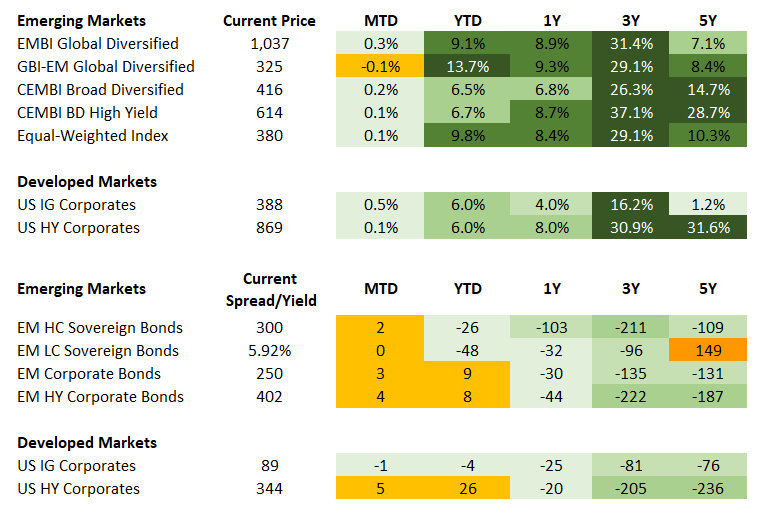
Equities
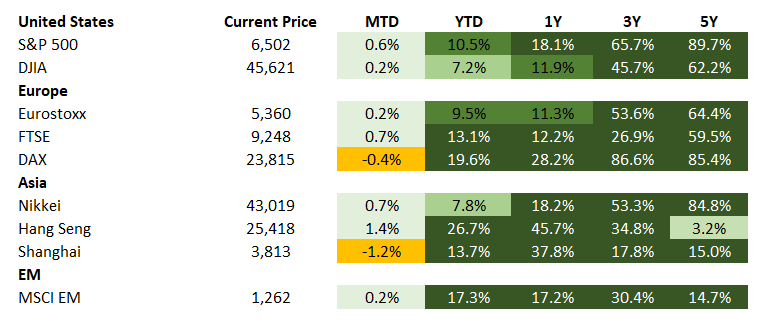
Commodities

Source for data tables: Bloomberg, JPMorgan, Gramercy. EM Fixed Income is represented by the following JPMorgan Indicies: EMBI Global, GBI-EM Global Diversified, CEMBI Broad Diversified and CEMBI Broad High Yield. DM Fixed Income is represented by the JPMorgan JULI Total Return Index and Domestic High Yield Index. Fixed Income, Equity and Commodity data is as of Sept 5, 2025 (mid-day).
Highlights
Legal Pressure on Turkish Opposition Causes Continued Political Risk
Event: A Turkish lower court invalidated the most recent Istanbul congress of the main opposition party (CHP) on allegations of graft and appointed a trustee to govern the party’s affairs in Istanbul, pending a final decision.
Gramercy Comment: This is the latest in a string of judicial interventions, largely seen as politically motivated, against prominent members of CHP’s political structure, including Istanbul’s popular and powerful mayor Ekrem Imamoglu. Mr. Imamoglu, considered to be the main political rival to President Recep Tayyip Erdogan, has been jailed since March awaiting appeal. His arrest six months ago triggered a sharp sell-off in Turkish assets on investor concerns about institutional erosion and the country’s general political landscape. Although considerably less acute, the negative market reaction to this week’s developments is a reminder that investors continue to remain cautious about lingering political risk in Türkiye. This caution is despite the impressive macroeconomic rebalancing and improvement in the economic policy management orchestrated by Finance Minister Mehmet Simsek and the central bank of Türkiye (CBT) leadership over the last couple of years.
Looking ahead, we’ll be paying close attention to CHP’s legal proceedings at the higher courts as well as any potential escalation in political pressure on Mansur Yavas, mayor of the capital city of Ankara and the next most likely CHP presidential contender – in the case that Mr. Imamoglu’s legal troubles continue to block him from politics.
Indonesian Protests May Trigger Further Policy or Cabinet Changes
Event: Domestic social unrest escalated last week following a hike in housing allowances for members of parliament (MP) and the death of a civilian by a police vehicle. This marked a significant escalation from the low-level protests that have occurred throughout the year amid broader discontent with an unequal macroeconomic backdrop that includes high youth unemployment and elevated costs of living. President Prabowo Subianto has announced cuts to MP perks including housing allowances and international travel. He has also pledged financial support for the family of the taxi driver killed by the police and promised an investigation into the incident. Protests subsided by the end of the week while Indonesian assets stabilized after experiencing moderate volatility.
Gramercy Comment: Domestic social pressure may result in greater fiscal spending, but we expect the fiscal balance to remain within the 3% of GDP cap in the context of an otherwise solid balance sheet that has a low debt-to-GDP ratio of 40%. We expect the central bank to continue to ease monetary policy amid a softer growth and inflation outlook. However, greater currency volatility could affect the magnitude and timing of cuts. We do not rule out future cabinet changes if protests re-escalate. For now, market friendly Finance Minister Sri Mulyana Indrawati has reiterated intentions to stay in her post, which should help keep markets well-anchored.
Emerging Markets Technicals
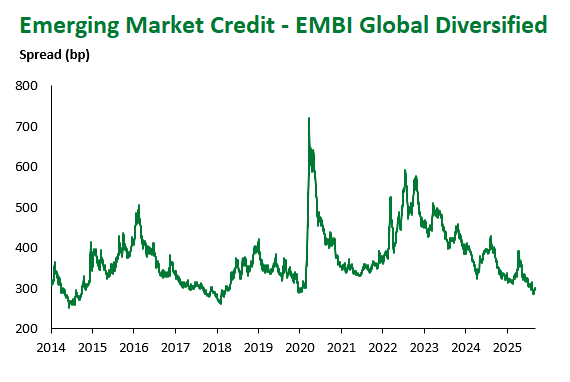
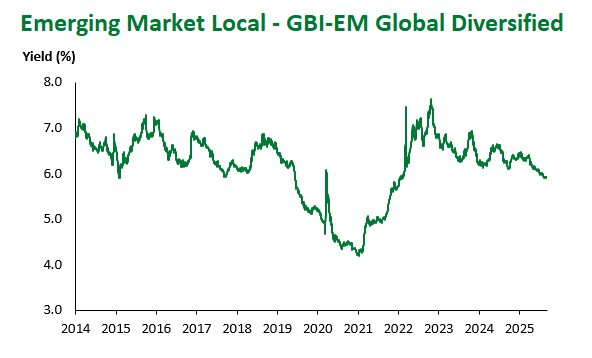
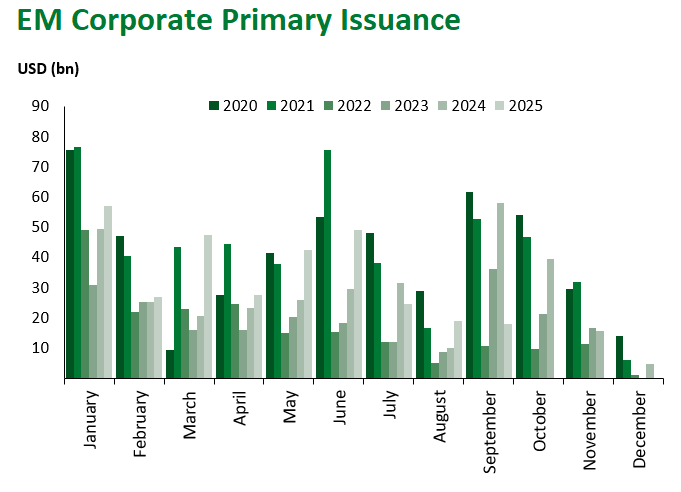
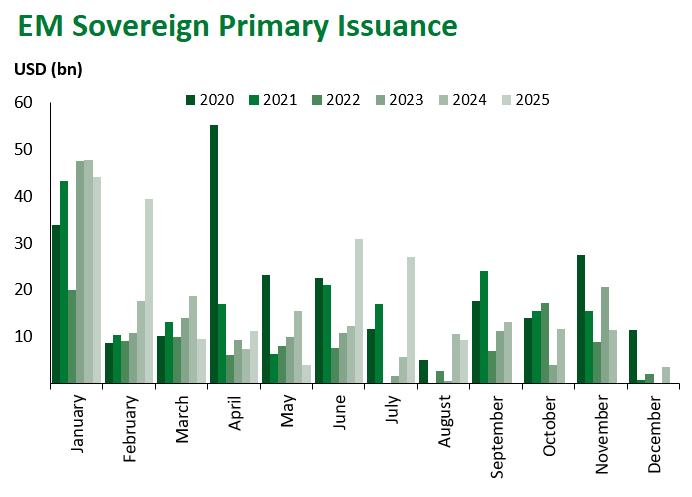
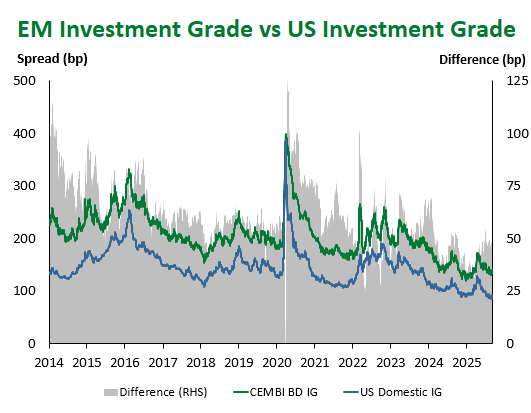
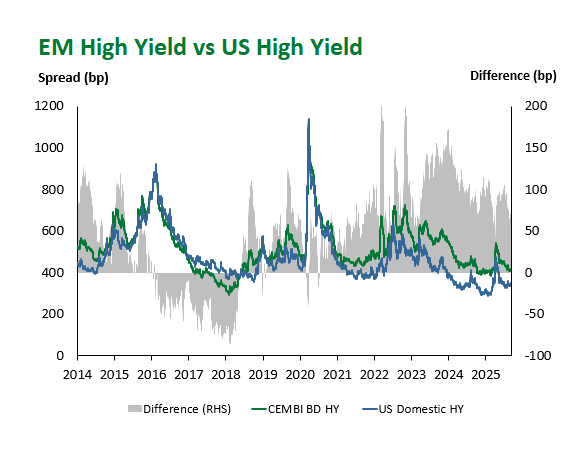
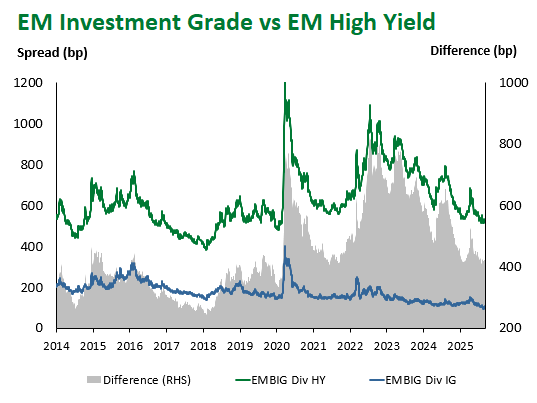
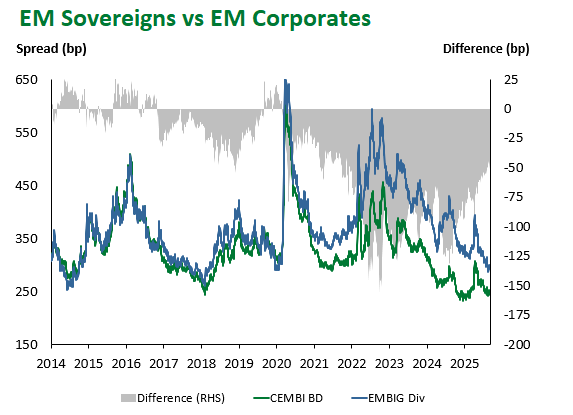
Emerging Markets Flows
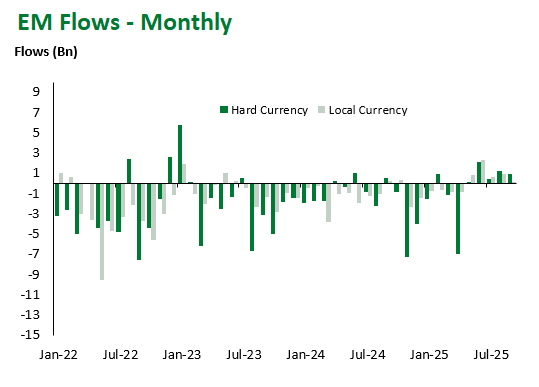
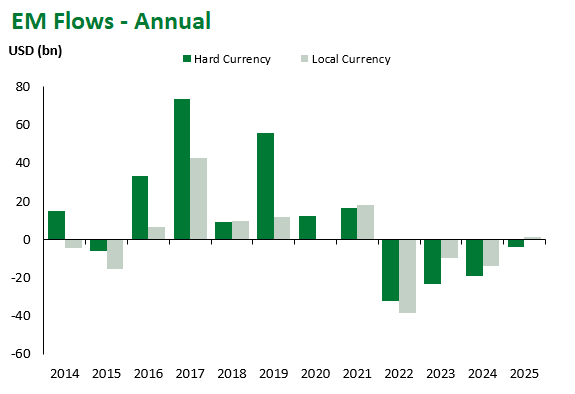
Source for graphs: Bloomberg, JPMorgan, Gramercy. As of Sept. 5, 2025.
For questions, please contact:
Kathryn Exum, CFA ESG, Director, Co-Head of Sovereign Research, [email protected]
Petar Atanasov, Director, Co-Head of Sovereign Research, [email protected]
This document is for informational purposes only. The information presented is not intended to be relied upon as a forecast, research or investment advice, and is not a recommendation, offer or solicitation to buy or sell any securities or to adopt any investment strategy. Gramercy may have current investment positions in the securities or sovereigns mentioned above. The information and opinions contained in this paper are as of the date of initial publication, derived from proprietary and nonproprietary sources deemed by Gramercy to be reliable, are not necessarily all-inclusive and are not guaranteed as to accuracy. This paper may contain “forward-looking” information that is not purely historical in nature. Such information may include, among other things, projections and forecasts. There is no guarantee that any forecasts made will come to pass. Reliance upon information in this paper is at the sole discretion of the reader. You should not rely on this presentation as the basis upon which to make an investment decision. Investment involves risk. There can be no assurance that investment objectives will be achieved. Investors must be prepared to bear the risk of a total loss of their investment. These risks are often heightened for investments in emerging/developing markets or smaller capital markets. International investing involves risks, including risks related to foreign currency, limited liquidity, less government regulation, and the possibility of substantial volatility due to adverse political, economic or other developments. References to any indices are for informational and general comparative purposes only. The performance data of various indices mentioned in this update are updated and released on a periodic basis before finalization. The performance data of various indices presented herein was current as of the date of the presentation. Please refer to data returns of the separate indices if you desire additional or updated information. Indices are unmanaged, and their performance results do not reflect the impact of fees, expenses, or taxes that may be incurred through an investment with Gramercy. Returns for indices assume dividend reinvestment. An investment cannot be made directly in an index. Accordingly, comparing results shown to those of such indices may be of limited use. The information provided herein is neither tax nor legal advice. Investors should speak to their tax professional for specific information regarding their tax situation.
